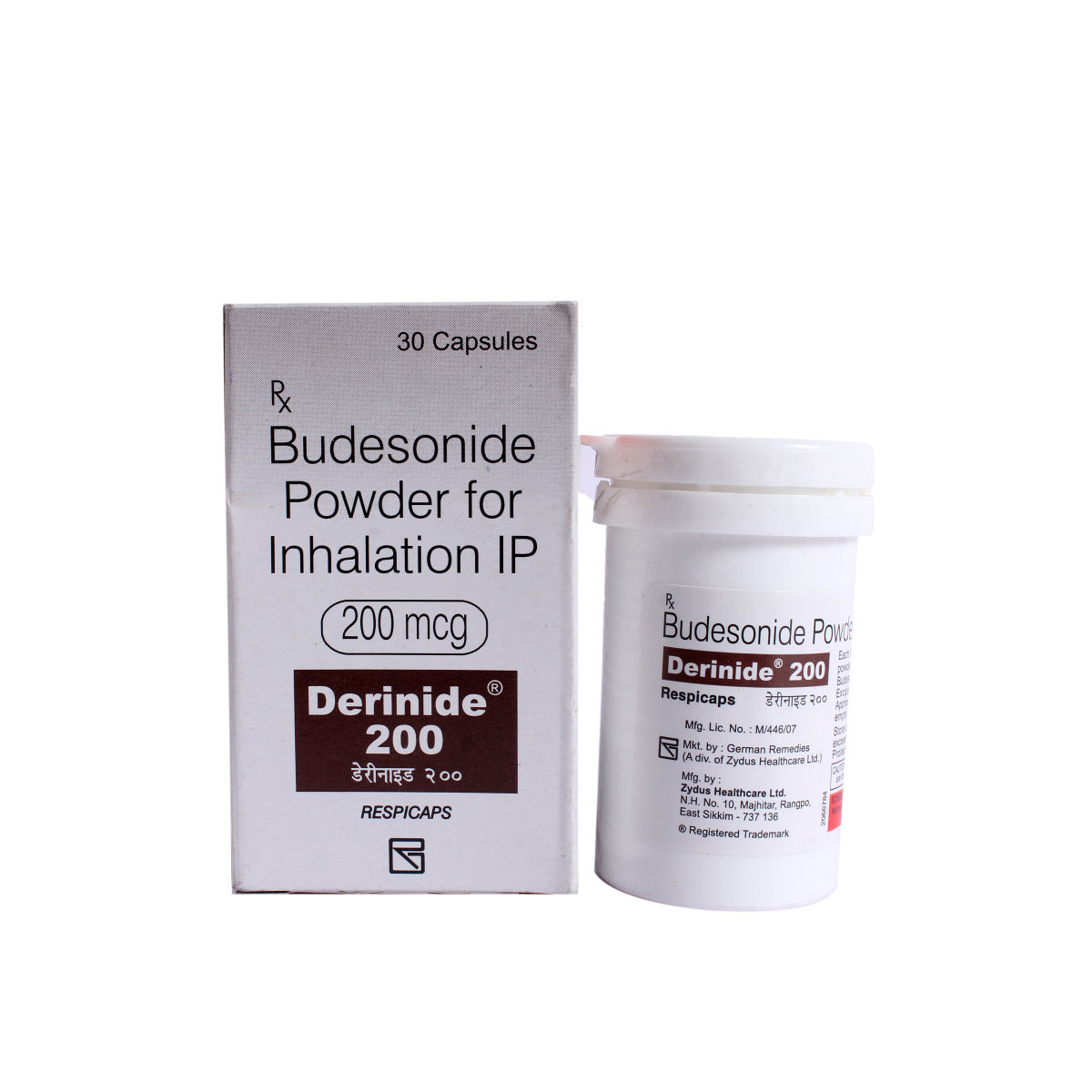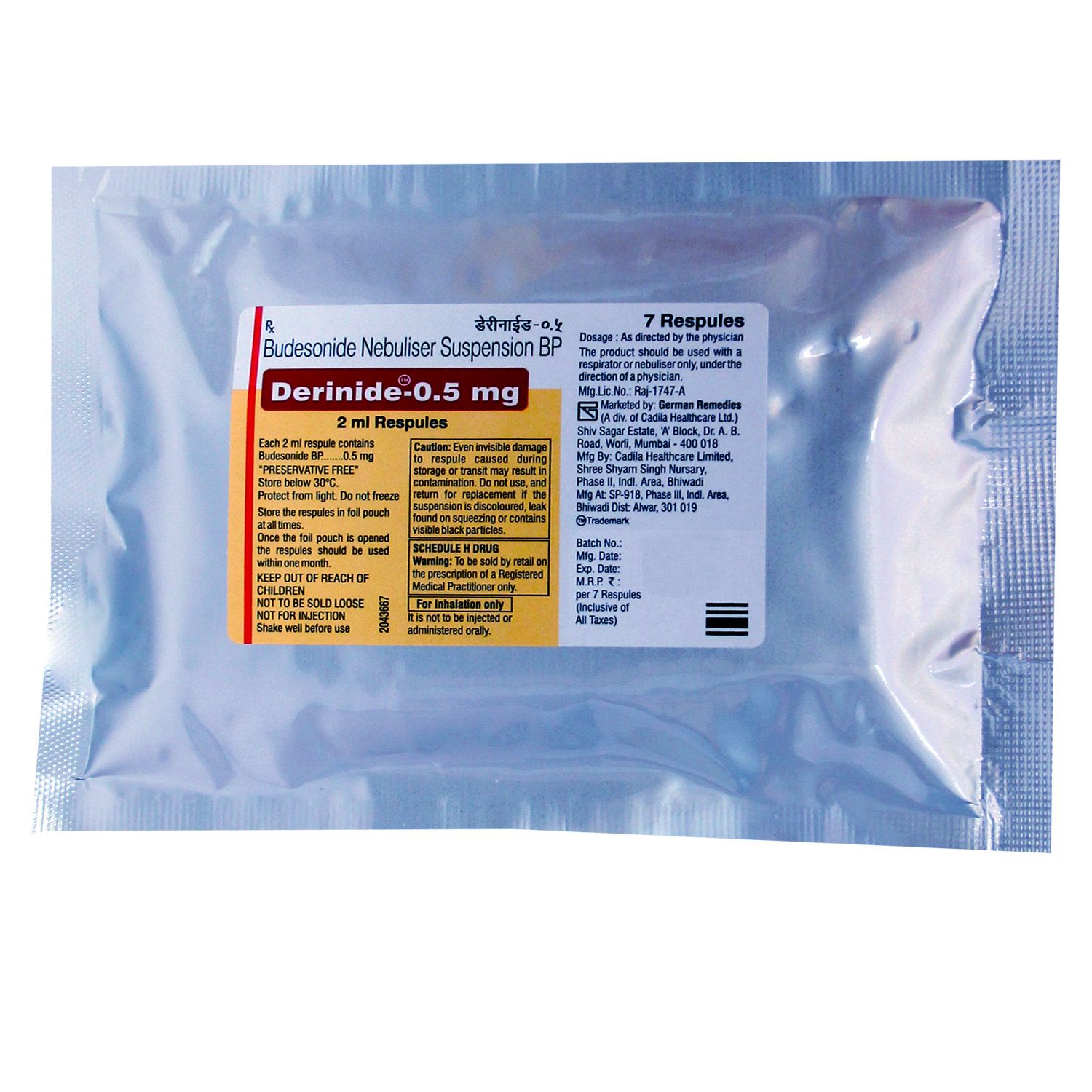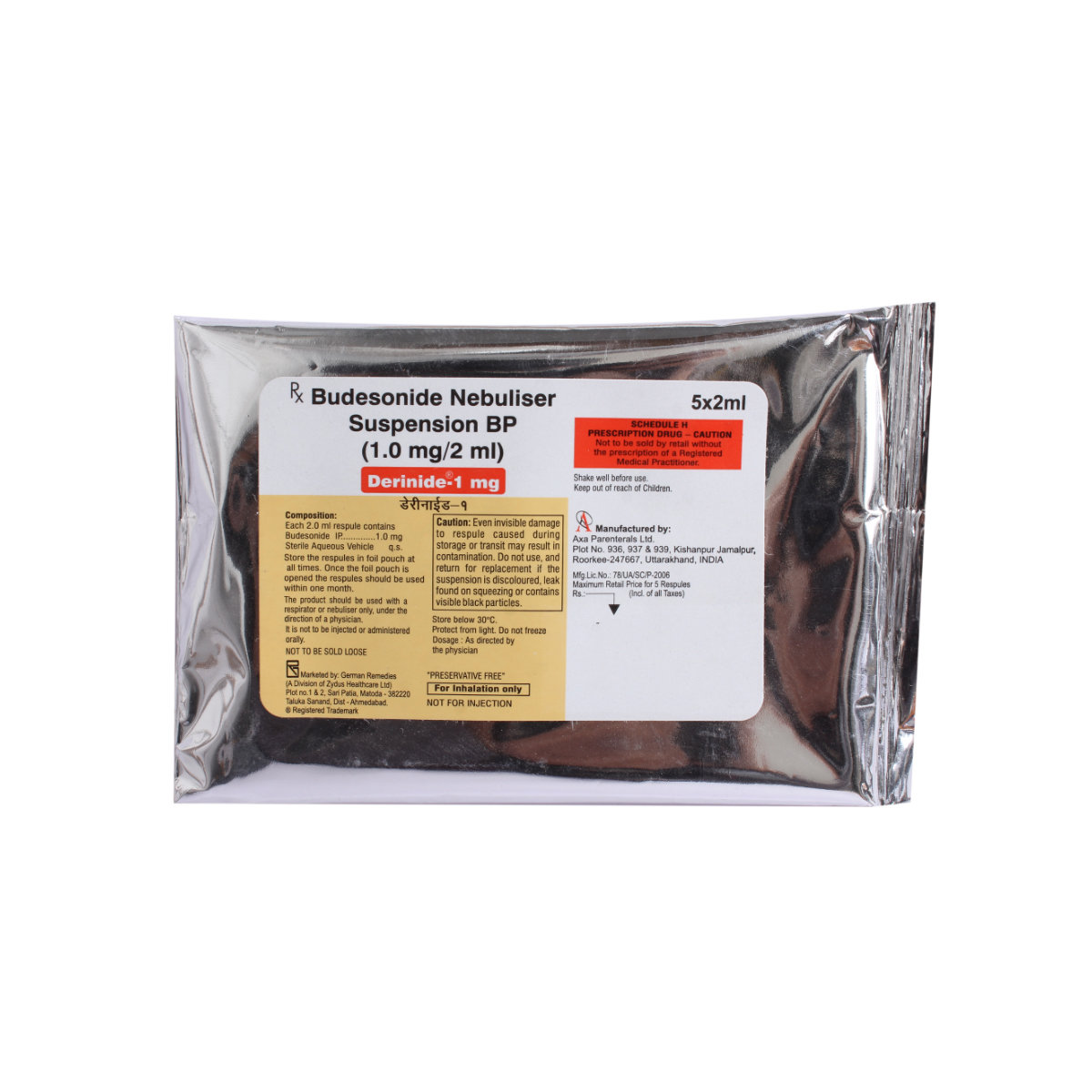Budesonide
About Budesonide
Budesonide belongs to the class of medicines called 'glucocorticosteroids' used to relieve symptoms of asthma and COPD (Chronic Obstructive Pulmonary Disease). Asthma is a chronic (long-term) respiratory condition in which airways narrow, swell, and produce extra mucus, leading to difficulty breathing. COPD is a group of lung diseases that causes obstructed airflow from the lungs.
Budesonide contains ‘Budesonide’. It works by blocking the making of certain chemical messengers that are involved in allergic and non-allergic-mediated inflammation. Thereby, Budesonide helps treat inflammatory diseases. Budesonide decreases inflammation and irritation in the airways and makes breathing easier. Thus, it provides relief from the symptoms of asthma and COPD.
Your doctor will decide the dose and duration based on your medical condition. In some cases, Budesonide may cause certain common side effects like indigestion, headache, abdominal pain, nausea, bloating, constipation, gas, vomiting, stuffy nose, tiredness/weakness, and sore throat. These side effects generally do not require medical attention and may fade away with time. However, you are advised to talk to your doctor if you experience any of the side effects persistently.
Consult your doctor before using Budesonide if you are pregnant or breastfeeding. Generally, Budesonide does not alter your ability to drive, but in some cases, it may cause dizziness, so drive only if you are alert. Budesonide is recommended for children only with a doctor's advice. The interaction of Budesonide with alcohol is unknown, therefore consult a doctor if you have any concerns. Keep your doctor informed about your health condition and medications to rule out any interactions.
Uses of Budesonide
Medicinal Benefits
Budesonide eases breathing by reducing swelling and irritation in the airways. It is used to treat various respiratory diseases like allergic rhinitis (allergy that causes itchy, watery eyes and sneezing), COPD (Chronic Obstructive Pulmonary Disease, a lung disease that blocks airflow and causes difficulty breathing), chest tightness, wheezing and coughing caused by asthma.
Directions for Use
Storage
Side Effects of Budesonide
- Indigestion
- Headache
- Abdominal pain
- Nausea
- Bloating
- Constipation
- Gas
- Vomiting
- Stuffy nosee
- Weakness/tiredness
- Sore throat
Drug Warnings
Do not use Budesonide without a doctor's advice if you are allergic to any of the contents or if you have severe liver disease. Inform your doctor if you have/had tuberculosis, infection, high blood pressure, diabetes, osteoporosis, peptic ulcers, glaucoma, cataracts, weak immune system, eczema, kidney or liver problems; if you have been treated with stronger cortisone preparation earlier. Consult your doctor before using Budesonide if you are pregnant or breastfeeding. Generally, Budesonide does not alter your ability to drive, but in some cases, it may cause dizziness, so drive only if you are alert. Budesonide is recommended for use in children only with a doctor's advice. Consult your doctor if you experience visual disturbances or blurred vision.
Drug Interactions
Drug-Drug Interaction: Budesonide may have interaction with medicines such as heart-related drugs (digoxin), antifungals (ketoconazole, itraconazole), antibiotics (clarithromycin), anti-epileptic medicines (carbamazepine), anti-tuberculosis drugs (rifampicin), antacids (cimetidine), anti-HIV drugs (ritonavir, cobicistat), and oral contraceptives.
Drug-Food Interaction: Grapefruit may interact with Budesonide and cause side effects. Hence, avoid grapefruit and its products. Also, it is safe to limit alcohol and caffeine intake.
Drug-Disease Interaction: Inform your doctor if you have/had tuberculosis, infection, high blood pressure, diabetes, osteoporosis, peptic ulcers, glaucoma, cataracts, weak immune system, eczema, kidney or liver problems.
Drug-Drug Interactions Checker List:
Safety Advice

Alcohol
cautionIt is advisable to avoid or limit the intake of alcohol while you use Budesonide as it may cause increased dizziness.

Pregnancy
cautionPlease consult your doctor before using Budesonide if you are pregnant. Your doctor will prescribe only if the benefits outweigh the risks.

Breast Feeding
cautionPlease consult your doctor before using Budesonide if you are breastfeeding. Your doctor will decide if Budesonide can be used by breastfeeding mothers or not.

Driving
cautionGenerally, Budesonide does not alter your ability to drive, but in some cases, it may cause dizziness, so drive only if you are alert.

Liver
cautionPlease consult your doctor before using Budesonide if you have a liver impairment or any concerns regarding this.

Kidney
cautionPlease consult your doctor before using Budesonide if you have kidney impairment or any concerns regarding this.

Children
cautionBudesonide is recommended for children below 12 years only when prescribed by a doctor.
Habit Forming
Diet & Lifestyle Advise
- Eat a healthy diet and exercise regularly to strengthen your breathing muscles and boost your immune system.
- Avoid foods such as cabbage, beans, garlic, onions, shrimp, pickled food, dried fruits, fried foods, carbonated drinks, wine, and bottled lemon and lime juice as it may worsen asthma symptoms.
- Know your triggers like allergens, such as pollen, dust, and food items that make your asthma severe.
- Do meditation, deep breathing, regular exercise and try progressive muscle relaxation techniques to get relief from stress and reduce the risk of an asthma attack.
- Quit smoking as it may reduce the effectiveness of Budesonide and irritate the lungs worsening breathing problems.
- Learning breathing exercises will help you move more air in and out of your lungs.
Special Advise
- Budesonide might affect certain test results. Inform the person doing the tests that you are using Budesonide.
- If you are due to undergo any surgery or if you need to be vaccinated, inform your doctor that you are using Budesonide.
Patients Concern
Disease/Condition Glossary
Asthma: It is a chronic (long-term) respiratory condition in which airways narrow, swell, and produce extra mucus leading to difficulty in breathing. The symptoms of asthma include wheezing (whistling sound while breathing), shortness of breath, chest tightness and cough, especially at night.
Chronic obstructive pulmonary disease (COPD): It is a group of lung diseases with emphysema (shortness of breath) and chronic bronchitis (inflammation of the lining of bronchial tubes). The major cause of COPD is smoking tobacco. Also, long-term exposure to fumes and chemicals may lead to COPD. The symptoms include chronic cough, shortness of breath or wheezing (whistle sound while breathing).
FAQs
Budesonide decreases inflammation and irritation in the airways and makes it easier to breathe. Thus, it provides relief from the symptoms of asthma and COPD.
Budesonide may cause brittle bones, bone loss, and a decrease in bone density if you use it for a long time. Inform your doctor if you have bone problems before starting Budesonide.
Maintain a gap of two hours between medicines such as cholestyramine (a drug used to treat high cholesterol), antacids and Budesonide as they might increase the effects of Budesonide. However, you are advised to use Budesonide with other medicines only after consulting your doctor.
Grapefruit may alter the effects of Budesonide. Therefore, avoid the use of grapefruit and its products whilst using Budesonide.
To treat your condition effectually, continue using Budesonide for as long as your doctor has advised. Do not be reluctant to speak with your doctor if you experience any difficulty while using Budesonide.










